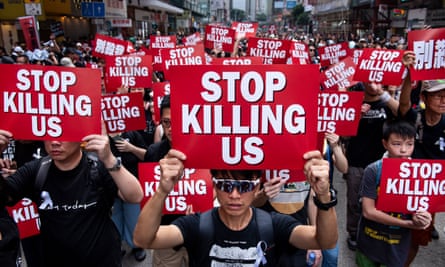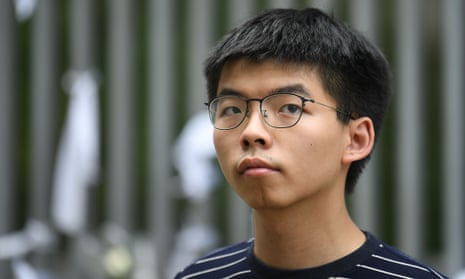Hong Kong’s leader, Carrie Lam, is the person responsible for mobilising the biggest protests in the city’s history, the freed student activist Joshua Wong has said.
The 22-year-old, who was the face of the last major demonstrations in Hong Kong in 2014, was released from jail on Monday following a two-month term for contempt of court.
He said that despite Lam’s “sincere and solemn” apology at a press conference, and her hint that the extradition law that sparked this month’s mass protests had been effectively retracted, the chief executive had not met any of her critics’ demands.
“For the 2 million-strong protest, all she said was sorry, but she has completely ignored public opinion,” Wong told the Guardian. “She couldn’t even make a promise that she won’t revive the bill within her tenure.”
Lam promised only that she would not revive the extradition law – which would allow Hong Kongers to be extradited to a Chinese justice system where the conviction rate is often as high as 99% – before it expires in July next year, and she refused to step down before her term ends in 2022.
Protesters are demanding she fully withdraw the extradition law and account for police brutality during the demonstrations, in which riot officers used rubber bullets and tear gas. They also want her to release those arrested, refrain from calling last week’s protest a riot, and resign.
Messages on social media indicate that unless these demands are addressed before 5pm on Thursday, demonstrators will rally in front of the government headquarters the following day.
“Against the backdrop of the G20 meeting, she is essentially mobilising people to take to the streets and embarrassing [the Chinese president] Xi Jinping,” said Wong. The 2019 G20 summit of the world’s leading economies will be held in Japan on 28 and 29 June.
Wong acknowledged, however, that, in a semi-autonomous city where there are civil freedoms but no democracy, forcing the government to indefinitely suspend the bill was “a symbolic achievement even if not a complete victory”.
The poor living conditions in Hong Kong’s prisons, such as being allowed to change uniform only once every four days despite having no air conditioning in sub-tropical heat, did not seem to have dented Wong’s determination. The secretary general of the Demosistō party said he regretted missing out on the mass protests of the past 10 days and was looking forward to joining any further actions.
Despite his youth, Wong is a seasoned activist. At 15, he became the face of a campaign which in 2012 forced the authorities to shelve a plan to introduce “national education” to Hong Kong schools. He was one of the leaders of the 2014 “umbrella movement”, which began when he was just about to turn 18.

Asked whether he would like to be the leader of the next set of protests, Wong sidestepped. He said: “As an organic movement, the anti-extradition protest is very decentralised. The key is not who is leading it.”
Many learned about the protests through messaging services, such as WhatsApp and Telegram, or via social media platforms, such as Facebook and Twitter. “When a movement has no leaders, it constitutes even greater pressure on the authorities to give concessions because they have no one to negotiate with and they can’t just go and arrest one of the leaders,” he said.
The opposition to the extradition bill came from not only the pro-democracy camp and young people, but also the business sector. The huge turnout for the protests – an estimated 1 million on 9 June and nearly 2 million on 16 June, were beyond anyone’s imagination, Wong said.
“The price they are paying for turning Hong Kong into a war zone is that they get to find out that the people’s reaction can be so strong,” Wong said.
He said Hong Kong people had been fighting to retain their freedoms since they came under Chinese rule in 1997 – from the opposition to a subversion law in 2003 which prompted500,000 to march, to the recent demonstrations. Each time, the fighting spirit grew stronger, he said.
“They have already radicalised a whole generation of young people,” Wong said.
But even under the “one country two systems” policy – which China pledged to stick to for 50 years after Britain handed over its former colony – Hong Kong has limited room to manoeuvre politically and the ultimate goal of democracy seems remote.
Asked whether he could face the same fate as the Chinese student leaders who went into exile after the crackdown on the Tiananmen pro-democracy movement 30 years ago, Wong said: “We don’t want to end up like them; that’s why we are doing what we are doing now.”
